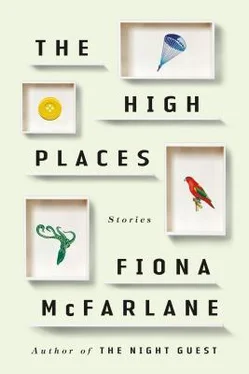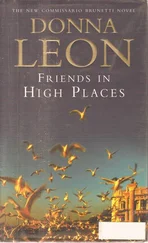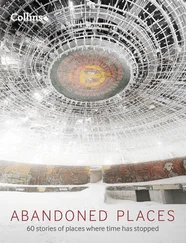* * *
At first we only saw the Americans in town. They played darts in the pub. They crossed the street in their meticulous uniforms to talk to pretty girls. They held dances in their hangars, and if the wind blew in the right direction the music reached our bedroom on Friday nights. They played their brass instruments in the main street of town. An American flag appeared at our school, next to the Australian one, and always caught the wind first, the real wind that came from the distant sea.
I performed better at school after the handsome Americans came to teach us about their handsome country. We learned of river chasms miles across, and thick trees, and coyote dogs that prowled the uproarious night. Our own rocks and reefs and strange marsupials paled beside these natural wonders. Our men in the Papuan jungle and North African sand had left us in capable hands, and Merrigool felt a kind of blessing in this stylish American presence, a safety it loved and claimed to have prayed for, as though the Japanese soldiers were at that moment advancing across the wheat plains with maps of our muddy river.
But Frank didn’t like the Americans. He said so in the evenings. They were bored, I suppose, and glossy and hilarious. Frank was never those things. They also didn’t think much of the local police.
‘They think,’ said Frank, ‘they’re a law unto themselves.’
Their behaviour on the weekend streets of lean Merrigool did leave a little to be desired. Even Edith’s faith must have wavered the Saturday night some descended on the town dressed as girls and painted black. I wish I’d seen them walking past the lit windows, revolving their droll hips. At first there were only these pranks, and flirtations, and lectures at the school. At first there was no bad luck. Then they began jumping from the sky.
They fell on our farm when the wind blew east. From a distance it looked soft — the billowing descent, the padded green, all the silk folding onto the warm yellow grass, like our mother pouring thick cake batter into a tin. Sometimes we were closer, watching the fields from the bush, and saw the Americans’ light-limbed run across the paddocks, the wind catching in their parachutes while the cows looked on, sleepy. We watched the morning jumps from our cloudy kitchen windows until our eyes tired from the light and we dragged through our chores. Our mother was never interested. Men fell in the yard and tangled in our washing. They scared her hens. One skimmed our roof and floated away down the gusty drive, his slim legs dancing. Our mother never cared one way or the other.
‘Tell me when it’s raining,’ she said. ‘Tell me when the Baptists are at the door to pay for the pond. Tell me when there’s cows in the yard and the barn’s on fire. That’s worth telling. Not those Americans.’
The Americans drifted back and forth, even in the night. They carried lights and radios. They carried ration packs they didn’t need. If we located them in the long grass, dizzy with gravity and knotted ropes, we helped them find the right way up and they gave us dried apples and chewing gum and smoked beef. They let us flap the green silk into the sky and run underneath it. We loved the terror of feeling trapped, the increased sound of our own breath. We stumbled and rolled and found each other, clutching at arms and shoulders, nostrils flaring, scrambling for a way out. We helped fold the chute, surprised at the size of it spread out like water and the size of it folded to nothing. The men who had fallen from the sky, in the way the men routinely did, shouldered their packs with their great green nets inside them. They left in the truck that came for them, always, riding with radios out of the hills.
With the sky full of Americans, I didn’t fear war. I didn’t fear the Germans or the Japanese. I didn’t fear the return of Jesus, though the Baptists prayed for it, wading in the pond, and I didn’t fear my father’s ghost staggering in the hallways with his ruined arm and scratched face, followed by tinfoil fish. I was also less afraid of Frank. I was silent around him, and watchful. For long stretches at a time, I was able to pretend he wasn’t with us at all.
Then, one Monday afternoon in the hot late March of that year, a plane crashed in the hills and all eight airmen died. An ordinary training flight, readying for tropical bombing over the green Pacific. They had been in our sky, looking down over our yellow town with its yellow river and fields and hills beyond it. All they had seen, before they fell, was the expansive sea and palmy islands and the paths of bombs across them.
We didn’t see the plane go down, though we all claimed we had, somehow skidding across our schoolroom windows and over the rooftops of the town. We did see the smoke: a plume of black that split the sky in two and resisted the half-hearted rain of the late afternoon. Nora and I hurried home that day. As soon as we arrived, we threw our school cases onto our beds and ran across the yard, down into and out of the gully and through the patchy bush that separated us from the hills. We wanted to run into the hills and find the plane. We wanted to follow the smoke for days if necessary, to see the collapsed airmen, none of them dead but piously calling for our help.
By the time we cleared the trees, however, it had begun to grow dark. The hills rose above us. We knew Frank would be driving the car that wasn’t his down the Merrigool road. Nora and I looked up at the hills and the smoke that was blurring into scrappy clouds and twilight. We turned around and made our way home.
There was no sign of the rain in the roots of the bush. The creek hadn’t risen, hadn’t budged from its course. In the dark, among the trees, we thought we could hear the Americans calling for help that wouldn’t come. Back in our yard, we paused to look up at the lit house. Dinner was over. Behind us the plane and the airmen smoked.
‘God help us,’ said our mother. ‘Here you are. Here they are. Where have you been? Wait, don’t tell me, I’m not interested. You disappear like rabbits, not a word, you don’t come home for tea. For all I know you’ve been bitten by a snake, both of you, lying in the bush bitten by snakes. That’s the last thing we need. Nora, what do you say? You’re fifteen years old, for god’s sake, Nora.’
Nora said nothing. Our mother pushed us through the kitchen and into the front room that we used only for winters and punishments, both unexpected. She straightened our clothes and neatened our damp hair and brushed leaves from our legs, as if preparing us to enter a church.
‘Here,’ said our mother, ‘is your father. Who has been worried sick and is very disappointed in you.’
I imagined our father slumped in the corner, his fishy feet worn out from pacing to and fro with worry. Then she left and we heard her moving about the kitchen, calm now, with no responsibility. She clucked at the baby in the way she liked to. There would have been a time when she clucked at us.
Frank did not look disappointed in us. He sat in the best red chair, which smelt of dogs and used towels, and eyed us thoughtfully, his bare policeman’s feet planted square on the yellow rug. In that undersized chair, his vast and neutral face was almost at our level. His knees rose higher than his belly. He wore a vest and his trousers and, keeping up his trousers, a belt. When I touched it much later, after Frank was dead, the belt was old and supple with use. That belt felt soft as a calf the day it’s born.
‘My children,’ said Frank, ‘never miss dinner.’
He ordered us to turn around, and he stood up. I remember his shadow on the wall. It was strangely diminished by the low-hanging light fitting, which swallowed his legs; I saw his arm, though, as it rose and fell, and the belt flying at the end of it. I remember being grateful that he did me first, and I wondered if the Americans might even then be flying overhead, dangling on their strings, and knew they weren’t, because of the smoke in the hills. I think I cried, but Nora didn’t.
Читать дальше












